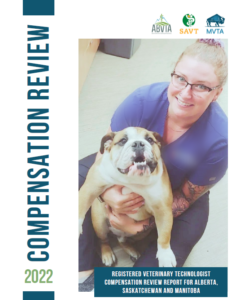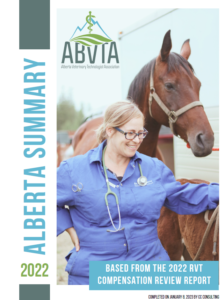Project Summary
The Alberta Veterinary Technologist Association (ABVTA), the Saskatchewan Association of Veterinary Technologists (SAVT) and the Manitoba Veterinary Technologists Association (MVTA) have commissioned this review. All three Associations are professional membership associations for registered veterinary technologists within their respective provinces.
The objective of the 2022 Registered Veterinary Technologist Compensation Review was to gain a comprehensive understanding of compensation and benefits provided to Prairie Registered Veterinary Technologists (RVT)s, this includes determining aggregate provincial and cross-provincial compensation practices. The primary goal for the review was to identify gaps and opportunities in said practices and make recommendations to achieve consistency for RVT compensation and benefits. In addition, information gathered provides a baseline for
future surveys and establishes common duties and responsibilities within the profession.
The 2022 RVT Compensation Review was based on data provided through a survey sent to all members of the 3 provinces, 3,868 in total (Alberta, 2,783; Saskatchewan, 640; and Manitoba, 445). Additionally, data from Statistics Canada, Conference Board of Canada, 2022 RVT Compensation and Career Survey; 2021 Alberta Veterinary Professional Workforce Project, 2021 ABVTA Wage & benefits Survey, 2021 SAVT Wage & Career Survey, and the 2020 MVTA Wage Survey was considered through the course of the review.
Through data and comments provided by 1556 (40%) of the total membership of all three provinces, a number of trends and observations were made that could ultimately influence the industry of animal health. The following highlights concerns and opportunities identified:
- No correlation to the level of compensation to years of practice.
- No correlation to level of compensation to specialized responsibilities.
- Limited paid training.
- Inconsistent starting wages for new graduates, including rates below provincial Employment Standards.
- Lower average hourly rate paid in rural locations to urban locations.
- Inconsistent overtime and on call rates – at times non-existent and possibly not meeting provincial Employment Standards.
- Inconsistent performance review practices and not always associated with pay increases.
- Inconsistent, and at times, absent practices regarding pay increases.
- Inconsistent benefit schemes that do not meet the needs of RVTs.
- Limited flexibility to attend to personal needs.
Nearly 30% of survey participants indicated they are intending to leave their employer in the next 2 years, citing issues with compensation and working conditions that include:
- stress
- burn out
- high turn-over
- limited ability for advancement
- poor management
- the work becoming too physically difficult for their age (aging out)
The report provides 17 recommendations for employers, RVTs, and their associated associations that address these issues.
Project Objectives
The deliverables of the consultancy were to complete a review and final report on the review, findings and recommendations for each province which will include the following:
- Conduct a survey of Registered Veterinary Technologists (RVTs) registered with ABVTA, SAVT and MVTA
- Utilize primary data from the survey
- Provide an analytical overview on the existing compensation in each province
- Comparison of compensation for RVTs in each of the provinces involved in the project
- Provide observations of trends and concerns
- Provide recommendations including optimal pay rates for RVTs in each province
- Develop a summary to be shared with industry for each Association
- Develop a summary to be shared with Association members
- Development of Job Profiles (JPs) for RVTs


Click here to download and view the full report.
Click here to view the member and industry summary.
Resources
A website has been launched collaboratively with SAVT and MVTA. This site includes resources for RVTs such as career planning, employment standards, career services. Additionally, resources for employers and industry can be found here as well, such as onboarding checklists and information on wage transparency.
Click here to visit the site
Click here to view resources